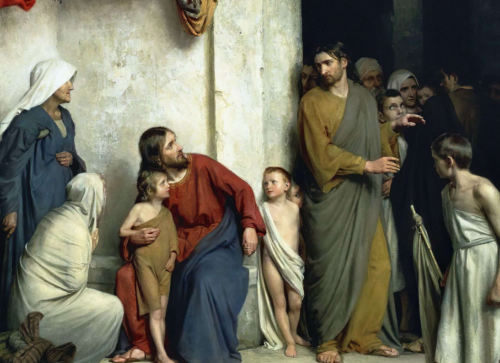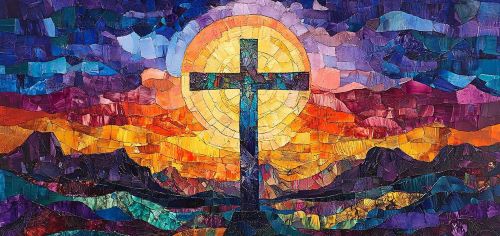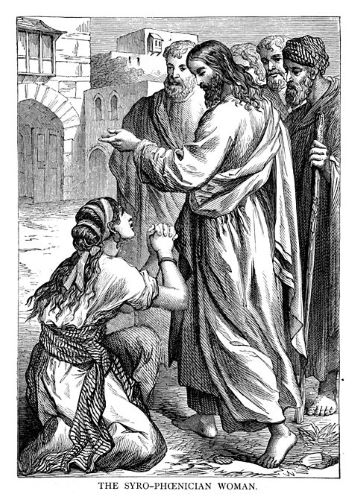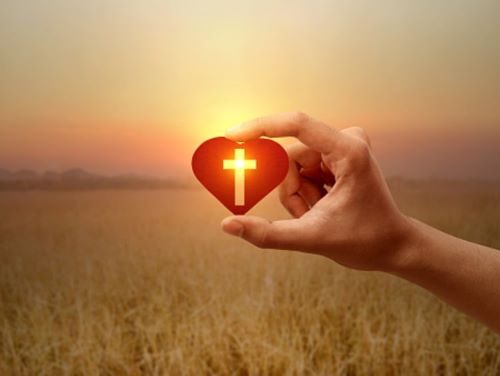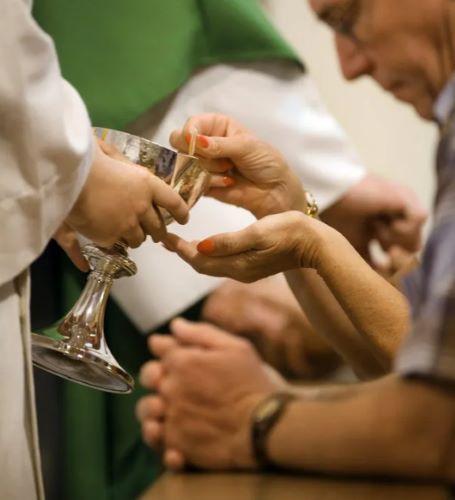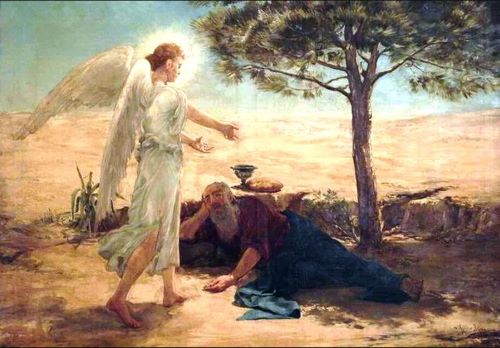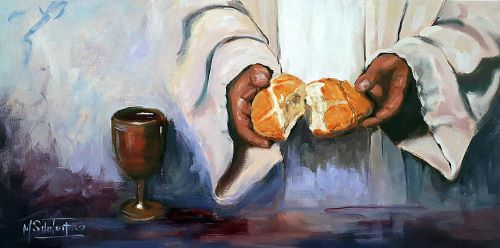Come Back Tomorrow
Year C
Isaiah 58:9b-14
Psalm 103:1-8
Hebrews 12:18-29
Luke 13:10-17
May the words of my mouth O God… speak your truth…
In Genesis Ch. 2:2-3… we’re told that on the seventh day… God finished the work that He had been doing… and He ceased on the seventh day from all the work that He had done… and God blessed the seventh day and declared it holy… because on it God ceased from all the work of creation that He had done… but what day of the week was the seventh day…
Although calendars have been modified down through the centuries… the seven-day weekly cycle has remained intact throughout history… the days of the week have always remained in their proper order… with Sunday as the first day of the week… and Saturday as the seventh… and since God commanded that the seventh day be observed a day of rest… according to God’s calendar… Jewish Jesus’ Sabbath day… was Saturday…
Now Exodus 25… begins seven full chapters of instructions for building the Tent of Meeting… and the Tabernacle… details about measurements and building materials and oil lamp stands and cherubim… and for inaugurating the priesthood… with details for Aaron’s vestments which included gold thread… blue, purple, and crimson yarns… and fine twisted linen… but Exodus 31:15a reiterates the sentiment we just heard in Genesis… when God says… six days may work be done… but on the seventh day there shall be a sabbath of complete rest… holy to the LORD… seven divine commandments about building the sanctuary… the last of which concerns the seventh day of the week… thus far… the instructions concerned a holy place… now the instructions emphasize the importance of a holy time… and now… as God created a holy time after constructing the world… Israel must observe a holy time even while constructing the sanctuary… and suspending construction on the Sabbath shows that for God… holy time is more important than holy space…
But there’s some strong language in both Exodus 31:14 and Exodus 35:2… both say that whoever works on the Sabbath shall be put to death… and whether we think God meant that literally… or simply as hyperbole… we can take from it that God places paramount value on holy time… time in which we are set free…
For me… and I think for many of us… the idea of Sabbath rest… comes from this story in Genesis… God rested… and so we rest… and if you’re an orthodox Jew… the Torah specifically mentions two prohibited activities… kindling a fire… and carrying anything… though there are thirty-nine categories of prohibited work out of which these two come… things like writing… cooking… washing… activities associated with planting and reaping and sewing and weaving… but the principle behind them… is that they represent some type of constructive… creative effort… demonstrating man’s mastery over nature… and so refraining from such activities on the Sabbath… acknowledges that in spite of our creative powers… God is the ultimate Creator and Master…
And if you’re Christian… and depending on your denomination and where you live… Sabbath prohibitions may include reading the paper… riding a bike… mowing the law… or going to the movies… but the idea of Sabbath rest doesn’t come as much from Genesis… as it does from Exodus 20… because according to God… it’s not about resting… it’s not about not doing… it’s about being set free… because God hates slavery… anything and everything which keeps us from being fully who we were created to be… and expressing God’s will for us…
The Decalogue… what in Hebrew is called the aseret hadevarim… are not actually commandments… their title is more properly translated as… the ten words or statements… and obedience to them is motivated not by fear of punishment… but by the people’s desire to live in accordance with God’s will…
In the ancient Near East… laws were believed to be the product of human minds… particularly the king’s… and while Mesopotamian kings claimed to have learned the principles of truth and justice from the gods… it was they themselves who turned those principles into specific laws… so implicit in this biblical view… is the understanding that God is Israel’s king… and therefore its legislator… and the author of its Laws…
And so I ask the question many have asked before me… was man… was woman… made for the Sabbath… or was the Sabbath made for them… for us… do humans serve the Sabbath… or are we served by the Sabbath…
And so on to the Gospel… we can understand that the leader of the synagogue… who was probably a lay person… was just following the rules when he said… Come back tomorrow to be healed… not today… not on the Sabbath…
Ronald Byars writes… the safest course… is to abide by the rules… they’re clear cut… there’s no ambiguity… DONE… but if so… then it would do well for us to remember that… when we’re trying to explain our situation to a representative of the airline… or the clerk in the department of motor vehicles…
The crippled woman in this text is not in mortal danger… Luke tells us that she has born her affection for eighteen years… couldn’t she just wait another day… or even another week… but it is easy to counsel someone else to be patient… that’s what those in power say over and over again to those who are unwell… or marginalized in one or more ways… because then fewer things need to change… or they end up changing more slowly… and rules are more likely to be considered reasonable when they don’t affect the rule enforcer… but have you noticed how people’s tenacity about rules… and their attachment to them… tends to become more flexible… when the weight of the rule presses heavily on someone close to them…
But if we follow Jesus’ lead… we don’t need to inject the delay of more deliberation… Not Today is just not an option… and if we remember last week’s Gospel… Jesus said… I came to bring fire to the earth, and how I wish it were already kindled… this is God’s passion and compassion to free all of us from anything which enslaves us and impinges on us…
Jesus’ liberation heals… calls us to be present… but what that also means is that the timing of another person’s freedom may be inconvenient for us… may put some of us to shame because in taking on God’s role of judging who’s worthy to be liberated… their limitations are held up against God’s boundlessness… and who are we to postpone justice and righteousness… we may have what seem like holy reasons… but for whom do they bring holiness… and really… given a choice… do we really want to prolong the suffering of others…
No… today is a day when we will act on someone’s behalf… and that’s why Jesus focuses on the person… on the relationship… and not on the law… that’s why he could transcend the synagogue’s legalism… and land on the side of justice for this woman… and if the Sabbath is about being freed from what oppresses us… about freedom from bondage… then Jesus did exactly the right thing in that moment… because if holy time is more important than holy space… then what better use of that holy time than to let God’s healing break through… and so the point of story is not that Jesus can heal… we know that he can heal… but that in response to this healing… the entire crowd was rejoicing at all the wonderful things he was doing…
The author of Hebrews challenges the image of a God on Mt. Sinai who’s removed from the people… a people who have come to something which cannot be touched… particularly a voice whose words made the hearers beg that not another word be spoken to them… and directs them to an image of God in the middle of the people on Mt. Zion… Jesus… the mediator of a new covenant… one who lived among us… walked among us… breathed among us… and died and rose again… among us… one who we can touch… and who can touch and heal us… and so we ask… where can Jesus help us and the church remove the weight of oppression… and where can Jesus help us un-cripple the Gospel…

